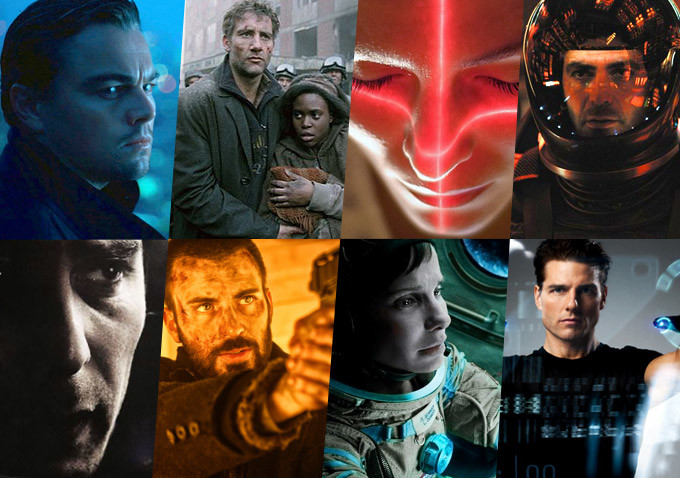 15. “Minority Report” (2002)
15. “Minority Report” (2002)
The second part of a masterful Spielberg sci-fi double bill, “Minority Report” was the helmer’s best blockbuster since “Jurassic Park,” but it also proved to be something more: an enormously inventive, unexpectedly funny procedural that delved into serious moral and philosophical issues in the way that all the best science fiction does. Based very loosely (about as loosely as “Blade Runner” and “Total Recall”) on a Philip K. Dick story, it’s set in a future where the police are able to stop murder before it takes place, only for the lead investigator (Tom Cruise) to be forced on the run when his name comes up. Scott Frank’s terrific script is a noirish, textured blend of mystery, action, and spectacle. It’s a harder-edged film than we’ve come to expect from Spielberg (at least until the slightly too-neat ending), but he, and his star, seems to relish the opportunity, tackling the film with a playfulness that had been lacking from much of his work in the years running up to this. The film’s so eerily prescient that it hasn’t aged a day, either.
 14. “Looper” (2012)
14. “Looper” (2012)
Somewhat similar to “Sunshine,” “Looper” — Rian Johnson‘s third feature after breakout noir “Brick” and loopy, unloved “The Brothers Bloom” — is half of a truly brilliant, all-time sci-fi classic. Unlike Danny Boyle‘s film, however, here it’s the second half that really takes flight, leaving a far more satisfying dismount, and hence its higher placement. In fact it starts out fairly generic, with the faintly ludicrous premise that, time travel having been invented, its chief use is by the future mob, which sends its enemies back only to have them instantly, and tidily executed in the past, leaving no pesky incriminating body. One such executioner, however, played by Joseph Gordon-Levitt and some prosthetics, is faced with a dilemma when his future bosses send his older self (Bruce Willis) back to him. So far, so high-concept mummery, but in the second half, with the introduction of Emily Blunt and her gifted son, the film switches gears and becomes unexpectedly wonderful, a quiet and melancholic reflection on destiny, fate, and, of all the hoary sci-fi cliches in the world, sacrifice.
 13. “Gravity” (2013)
13. “Gravity” (2013)
While it’s true that Alfonso Cuaron’s “Gravity,” strictly speaking, does not fall into the sci-fi category (it uses existing tech and is set more or less contemporaneously), the space-set survival tale qualifies for us, more for the very sci-fi sense of wonder and curiosity it embodies. Immaculately shot by Oscar-winner Emmanuel Lubezki, including the now famous, stiched-together “unbroken” sequence at the beginning, and convincingly performed by an assured and sympathetic Sandra Bullock, the film has its flaws — some clunky dialogue and a slightly misbegotten detour with George Clooney’s character. But its poetry is all in its images, which amount to the most ravishing evocation of being alone in space we’ve ever witnessed, and a best-ever, ever use of IMAX 3D. In fact, perhaps it qualifies as sci-fi more for the manner of its creation than for its (admittedly slim, but still) resonant story — the rigs, sets, and cg whizzery required to bring it to such immaculately realistic life are already legendary.
 12. “Attack The Block” (2011)
12. “Attack The Block” (2011)
So John Boyega is about to be one of the biggest sci-fi stars in the world, but to certain observers of inventive, low-budget British cinema, he already kind of is. As the MVP in writer/director Joe Cornish‘s absolutely terrific “Attack the Block,” (exec produced by Edgar Wright) Boyega, in his debut, inhabited Moses, the surly thug who goes from mugger to unlikely resistance leader when his council block comes under attack from aliens. Correction, from “big alien gorilla wolf motherfuckers.” But while he absolutely blisters in the film, never lapsing into anything as uncomplicated as a straight-up hero, “Attack the Block” is really a triumph of writing and directing, and the canny ability to shape a narrative that, while it’s about an alien invasion, of all the big, expensive-sounding things in the world, could be delivered on slender budget with no sense of compromise. In fact, the lo-fi feel significantly adds to the film’s effectiveness, as it becomes less a bombastic spectacle, and more an examination of character, pack mentality, and the survival instinct, when an outside menace forces uneasy alliances between natural enemies.
 11. “Inception” (2010)
11. “Inception” (2010)
The most original, boldest, and unusual blockbuster of the 21st century so far, “Inception” is a deeply personal delve into the psyche of Christopher Nolan, an explosive, visually delirious action movie about grief and catharsis that somehow made $800 million worldwide. Tracking Leonardo DiCaprio’s dream-thief as he attempts to pull the biggest heist of his career in order to return home to his children and get past the death of his wife, it’s a thrilling, Bond-aping adventure with a rigorously constructed universe (too rigorous for some) and some of the most memorable images and set-pieces of 21st century cinema — up-ended Paris, the corridor fight, the waves on the beach, the spinning top. But it’s also the most expressionistic thing that Nolan’s made, melding the best cast he’s ever assembled, Hans Zimmer’s iconic score, and next-level editing into a grand symphony of the mind. Five years on, it feels more than ever that this might be Nolan’s masterpiece.






I’m alright with the list, but as is the trend with ‘countdowns’ you gotta mention the one that you feel the author left out. In this case, I nominate “Coherence”.
Purple Monkey Dishwasher